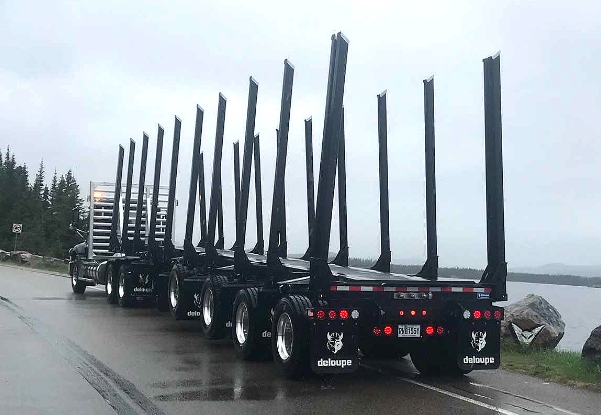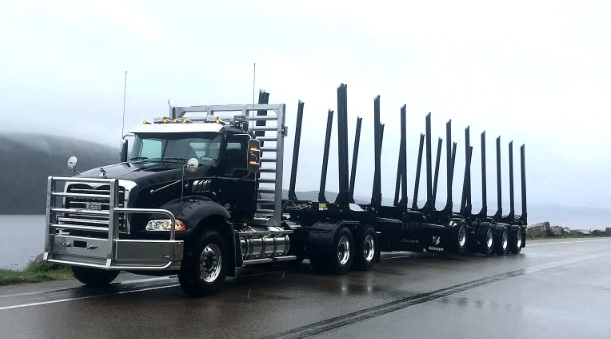FPInnovations, a non-profit organization dedicated to advancing the Canadian forest sector’s global competitiveness, has made significant advancements in fuel economy and greenhouse gas emissions reduction through the field testing of an innovative electric drive trailer designed for forest operations.
In collaboration with Deloupe, FPInnovations has successfully developed a prototype trailer featuring an electric drive axle. The implementation of this innovative technology, with the support of Voltari Power, a subsidiary of Voltari Marine Electric, demonstrates the potential for the forest transportation sector to contribute to the fight against climate change.
Stéphane Renou, President and CEO of FPInnovations, expressed great enthusiasm for the impressive results achieved.
“These results not only align with their objectives of reducing greenhouse gas emissions and fossil fuel consumption but also highlight the potential of FPInnovations and its partners in developing innovative and environmentally friendly technologies for the forest transportation sector.”
The successful implementation of this project was made possible through substantial investments exceeding $1.8 million. These funds were provided by various organizations, including Natural Resources Canada’s Clean Growth Program and Forest Innovation Program, the Quebec government’s Innov-R program through research and development consortiums (InnovÉÉ), and the Ministry of Forests in British Columbia. The collective support from these entities played a crucial role in bringing this innovative initiative to fruition.
Minister of Natural Resources, Jonathan Wilkinson, emphasized the importance of developing and implementing emission-free solutions across all sectors of the economy to combat climate change.
“The significant progress made by FPInnovations in this regard, highlighting their role in driving sustainable economic growth through innovative solutions.”
Wilkinson expressed confidence in the capabilities of Canadian innovators to contribute to the reduction of greenhouse gas emissions and pave the way for a greener and more sustainable future.
While electric trucks are gaining traction, there are still significant challenges to overcome in heavy and long-haul applications, such as limited transport range and a lack of infrastructure, including recharging stations and low-carbon fuel supply options in remote resource road locations. FPInnovations is taking a leading role in addressing these challenges and making a tangible impact in the forest transportation sector. The field tests conducted on their hybrid electric tractor semi-trailer yielded impressive results:
- with average fuel savings of 12%;
- the potential to reduce annual greenhouse gas emissions by 23 tonnes of CO2 equivalent (CO2 eq) per vehicle.
Pierre-Luc Lavallée, the general manager of Deloupe, expressed his pride in collaborating with FPInnovations on this project. The entire Deloupe team was dedicated to producing the prototypes used in the tests.
“The positive results obtained validate the project’s potential to provide cost-efficiency to users while simultaneously reducing the environmental impact of transportation. Deloupe is honored to contribute to the exploration of alternative solutions that enable the transportation sector to align with environmental challenges.”

Compelling results
During the initial road tests, a semi-trailer was utilized, with one of the conventional axles replaced by an electric motor-powered drive axle and high voltage components. The trailer was equipped with load cells to monitor the push-pull interactions between the trailer and the truck, ensuring safety. Furthermore, the electric system of the trailer is designed to be reusable when the trailer reaches the end of its useful life. These tests also served as a proof of concept for the next phase, which involves the development of an electric trailer specifically for biomass applications and a more durable prototype for testing on forest roads.
The tests were conducted in February and March of 2023, following the internationally recognized TMC Fuel Consumption Test Procedure – Type II RP 1102A (TMC, 2014). The testing route covered a distance of 105 km, including an 89 km mountainous section with a maximum elevation difference of 355 m. The results of the tests revealed exceptional dynamic performance and reduced time cycles. The average fuel savings achieved ranged from 10.5% to 14.1% per test run, with an impressive 17.5% fuel savings recorded for the uphill section and 9.4% for the downhill section. These results are highly promising and further improvements to the prototype could potentially enhance the fuel savings even more.
During the tests, activating the electric drive axle on the hybrid electric tractor-trailer led to an average reduction of 23.3 kg CO2 eq per 100 km in greenhouse gas (GHG) emissions. Considering an average annual driving distance of 100,000 km, this translates to a potential annual GHG emission reduction of approximately 23 tonnes CO2 eq per vehicle. Such significant emission reductions have the potential to contribute to Canada’s efforts in achieving a carbon-neutral balance by removing approximately 7500 tonnes CO2 eq per year.
During the tests, the safety aspect was carefully evaluated. Feedback from the drivers indicated that the electric trailer system, with the assistance of the electric axle, proved to be a valuable asset. The drivers appreciated the power reserve and energy recovery capabilities, particularly on steep grades and in stop-start traffic conditions during rush hour congestion. The electric trailer system enhanced the overall safety and performance of the vehicle, providing a smooth and efficient driving experience.

